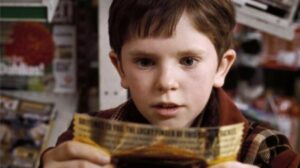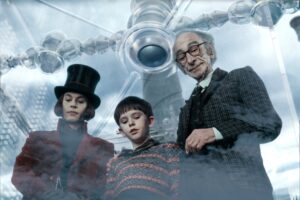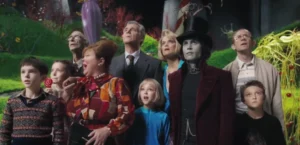Publication Date: 12-13-2023
Charlie and the Chocolate Factory (2005) review
Dir. Tim Burton
By: Steve Pulaski
Rating: ★★★½
The first thing to note about Tim Burton’s Charlie and the Chocolate Factory is its title. Unlike the 1971 classic, this one assumes the title of Roald Dahl’s 1964 novel, and rightfully so. Willy Wonka & the Chocolate Factory was appropriately named because the film focused mostly on the man of mystery behind such a wonderous chocolate factory, as well as his quietly sinister edge that only made more charming. Burton’s film firmly revolves around Charlie, and though it keeps the linear course of events in tact, it manages to deliver something as equally entertaining as its predecessor.
My recent viewing of Tim Burton’s Charlie and the Chocolate Factory probably marks my fourth or fifth in total. I saw it in theaters during its initial release in summer 2005, and it became something of a comfort viewing for me during my subsequent pre-teen years. To this date, I’m still not entirely sure why it has the polarizing effect that it does, Johnny Depp’s performance aside. In many ways, Charlie and the Chocolate Factory represents a perfect confluence of events that led to it being the only “hit” film based on a Roald Dahl novel to date. You would’ve been hard-pressed to find two hotter names in Hollywood than Burton and Depp in the mid-aughts, not to mention the enduring appeal of a children’s novel predicated on imagination, fantasy, and confections.

Burton’s film opens with a mesmerizing montage of how Willy Wonka’s famous Wonka Bars. A select five of the millions of chocolate bars are also packaged with a golden ticket inside the wrappers. Those lucky enough to find them will be rewarded with a tour of Willy Wonka’s illustrious candy factory, which has been closed to the public for decades. Cut to the crowded abode of the Bucket family, who live in squalor in a rapidly decaying, slanting house amidst another snowy London winter. Young Charlie (a terrific Freddie Highmore) sleeps in the attic in a room that’s open to outside elements. All four of his grandparents sleep in the same bed while his mother (Helena Bonham Carter) tends to housework and his father (Noah Taylor) slogs away at a toothpaste factory. It seems that the elderly-yet-nimble Grandpa Joe (David Kelly) has instilled the same kind of childlike optimism that has kept the smile on Charlie’s face despite their dour living conditions.
When Wonka launches the contest, several children from around the world slowly but surely happen upon the tickets. The first is August Gloop (Philip Wiegratz), a glutton of a boy who never encountered a candy bar he wouldn’t soon devour in seconds. The next is Veruca Salt (Julia Winter), a spoiled rotten English girl; then Violet Beauregarde (AnnaSophia Robb), a fiercely competitive gum-chewer; followed by Mike Teavee (Jordan Fry), a boy who views the world through the prism of video-games and television. Naturally, Charlie finds the fifth and final golden ticket, with Grandpa Joe, a former employee of Wonka’s, taking him to the factory on the day of the tour.
One of the most striking attributes of Burton’s film — even after repeated viewings and the passage of 17 years — is how visually dazzling it is. Wonka’s chocolate factory looks like a slightly off-kilter version of Disneyworld, with the presence of Oompa Loompas (all played by Deep Roy, who is duplicated a dozen times over via CGI) feeling more dimensional than in the 1971 film (although Roy plays them with a slight degree of ominousness, which I’d argue helps make them more intriguing). Burton and production designer Alex McDowell run the gambit of bringing Wonka’s revelations to life, including a sugar-rush of a room that includes a flowing chocolate river, sugary grass, and gumdrop trees that, in all their colorful beauty, threaten to make Gene Wilder’s palace look like a Saturday Night Live backdrop by comparison.

The sets are indeed immersive, as is the way they play into each of the children’s weaknesses, all of which they succumb to whilst on Willy Wonka’s tour. Charlie and the Chocolate Factory marks the return of Burton’s collaborative partnership with composer Danny Elfman, and the cinematic marriage results in an array of songs that’s stylings range from new wave to hard rock, and even Bollywood (none better than “Mike Teavee,” which visually incorporates all three). To anyone who, like me, saw this film at a young age: if nothing else, go back and watch the musical numbers, for you’ll understand them more in your olden age.
Much was, has, and will continue to be made about Johnny Depp’s performance as Wonka, which mixes Michael Jackson-esque mannerisms with that trademarked, mid-aughts weirdness only Depp could achieve in his prime. Depp’s Wonka isn’t as muted in its cynicism as Wilder’s; in fact, he more-so doubles-down on the paradox of Wonka himself. In every version of this story, Wonka is someone who clearly doesn’t like children despite harboring a fixation for their innocence and wonderment. Those fixations have led him to a life of inventing and manufacturing certain gateways that keep that spirit nigh, as least in the eyes of a child, be them Scrumdidilyumptious Bars or Everlasting Gobstoppers. Depp’s performance is multilayered in his contempt for children, his endearing trauma which turned into motivation as an adult, and a desire to keep magic alive for the kids with whom he’d rather not interact on a daily basis.
There was something about mid-2000s movies that loved giving us additional backstory to fabled characters. Consider the prologue to Rob Zombie’s Halloween, which showed Michael Myers’ wretched, pitiful childhood. Burton and screenwriter John August afford Willy Wonka some respect in illustrating his childhood, which needn’t be summarized more than by revealing that the junior Wonka was raised by a respected, no-nonsense dentist (played by Christopher Lee no less). Allegedly, the film’s climactic scene involving Wonka returning to his dad’s practice echoes Burton’s final encounter with his mother, who wasn’t initially supportive of her son’s filmmaking ambitions. Some critics and audiences feel these additional details are extraneous and don’t contribute to a picture as a whole. For me, both films are examples where they felt too richly realized to be considered filler.
Charlie and the Chocolate Factory isn’t technically a remake of the 1971 film. It’s simply another adaptation of Dahl’s story, which has proven generationally timeless. Both films bring thematic weight, visual thrills, and fiercely entertaining character types to the forefront, and their differences, both in style and perspective, lead to delightful confections that deserve appreciation.
My review of Willy Wonka & the Chocolate Factory (1971)
My review of Wonka (2023)
Starring: Freddie Highmore, Johnny Depp, David Kelly, Philip Wiegratz, Julia Winter, AnnaSophia Robb, Jordan Fry, Helena Bonham Carter, Noah Taylor, Missi Pyle, James Fox, Deep Roy, and Christopher Lee. Directed by: Tim Burton.
About Steve Pulaski
Steve Pulaski has been reviewing movies since 2009 for a barrage of different outlets. He graduated North Central College in 2018 and currently works as an on-air radio personality. He also hosts a weekly movie podcast called "Sleepless with Steve," dedicated to film and the film industry, on his YouTube channel. In addition to writing, he's a die-hard Chicago Bears fan and has two cats, appropriately named Siskel and Ebert!


